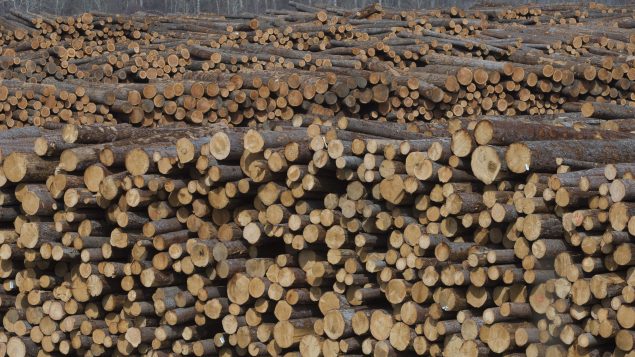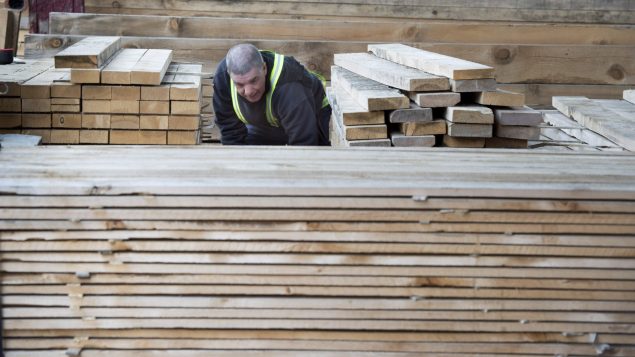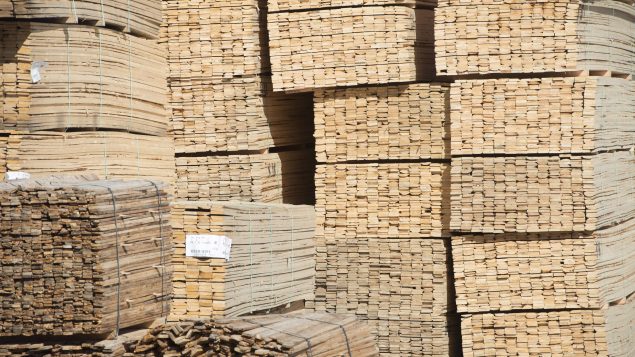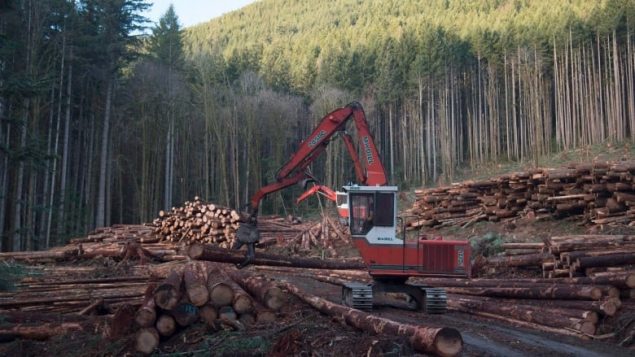The long-running Canada-U.S. dispute over softwood lumber–a dispute that first arose in 1982–has taken another turn.
Ottawa and Washington have been arguing about the $22-billion a year industry that employs an estimated 200,000 people in Canada for nearly 40 years and on Monday the World Trade Organization’s dispute-resolution panel declared that the U.S. Department of Commerce and the U.S. International Trade Commission were wrong in 2017 when they imposed countervailing duties on Canadian softwood lumber exports.
To absolutely no one’s surprise, Washington immediately denounced the decision as unfair, biased and flawed while Canadian officials and lumber producers hailed the ruling.
“U.S. duties on Canadian softwood lumber are completely unwarranted and unfair. This decision confirms that,” Canada’s International Trade Minister Mary Ng said in a statement after the ruling was announced.

Softwood lumber is pictured at Tolko Industries in Heffley Creek, B.C. on April, 1, 2018. Canada and the U.S. have been arguing about softwood lumber since 1982. (THE CANADIAN PRESS/Jonathan Hayward)
United States Trade Representative Robert Lighthizer felt otherwise, saying the decision unfairly protects Canada from American retaliation against what he calls “massive” lumber subsidies north of the border.
Lighthizer added that the report proves U.S. claims that the trade body’s dispute resolution system is unfair and biased against American interests.
U.S. producers have long argued that Canada’s lumber industry is unfairly subsidized by federal and provincial governments because most timber is owned by provincial governments, making so-called stumpage fees–the Americans maintain–subject to U.S. law.
In the U.S., most timber is on private property, and in 2017 Washington slapped two types of tariffs, anti-dumping and countervailing duties, on Canadian lumber.

A worker tidies up a pile of planks at a lumber yard on April 25, 2017 in Montreal. The U.S. plans to impose significant duties of up to 24 per cent on lumber imports. According to government estimates, the $22-billion softwood lumber industry employs 200,000 people in Canada. (THE CANADIAN PRESS/Paul Chiasson)
Monday’s WTO report stems from Canada taking issue with those 2017 duties, which are currently set at at 20.23 per cent.
In particular, the panel agreed with Canada’s argument that the U.S. Department of Commerce made a number of errors in determining the benchmark Canadian timber prices the it used to determine whether Canadian producers were paying adequate stumpage fees to the provinces.
“For more than three years, our industry has paid billions of dollars in countervailing duties that (Monday’s) decision confirmed should never have been paid in the first place,” B.C. Lumber Trade Council president Susan Yurkovich said in a statement.
“This report is a scathing indictment of the U.S. Department of Commerce’s subsidy findings and the biased process it followed in reaching them.”

Softwood is unloaded at Murray Brothers Lumber Company woodlot in Madawaska, Ontario on April 25, 2017. (THE CANADIAN PRESS/Sean Kilpatrick)
Monday’s WTO report comes less than two months after the new U.S.-Mexico-Canada Agreement formally replaced the NAFTA trade deal and also follows a U.S. decision to restore 10 per cent national-security tariffs on exports of Canadian aluminum.
Monday’s case was the ninth before the WTO in the lumber dispute, concerned subsidies.
A different WTO panel last year largely upheld U.S. anti-dumping duties on Canadian lumber, prompting a Canadian appeal.
The U.S. has 60 days to appeal Monday’s ruling.

Stacks of lumber are pictured at NMV Lumber in Merritt, B.C. on May 2, 2017. (THE CANADIAN PRESS/Jonathan Hayward)
If it does, it will not take effect unless it is upheld by the WTO’s appellate body.
It is also quite possible the ruling will never take effect because the U.S. is blocking the WTO’s dispute resolution system.
As a result, the case could remain in legal limbo indefinitely, meaning the tariffs on Canada will stay in place.
With files from CBC News, The Canadian Press







For reasons beyond our control, and for an undetermined period of time, our comment section is now closed. However, our social networks remain open to your contributions.